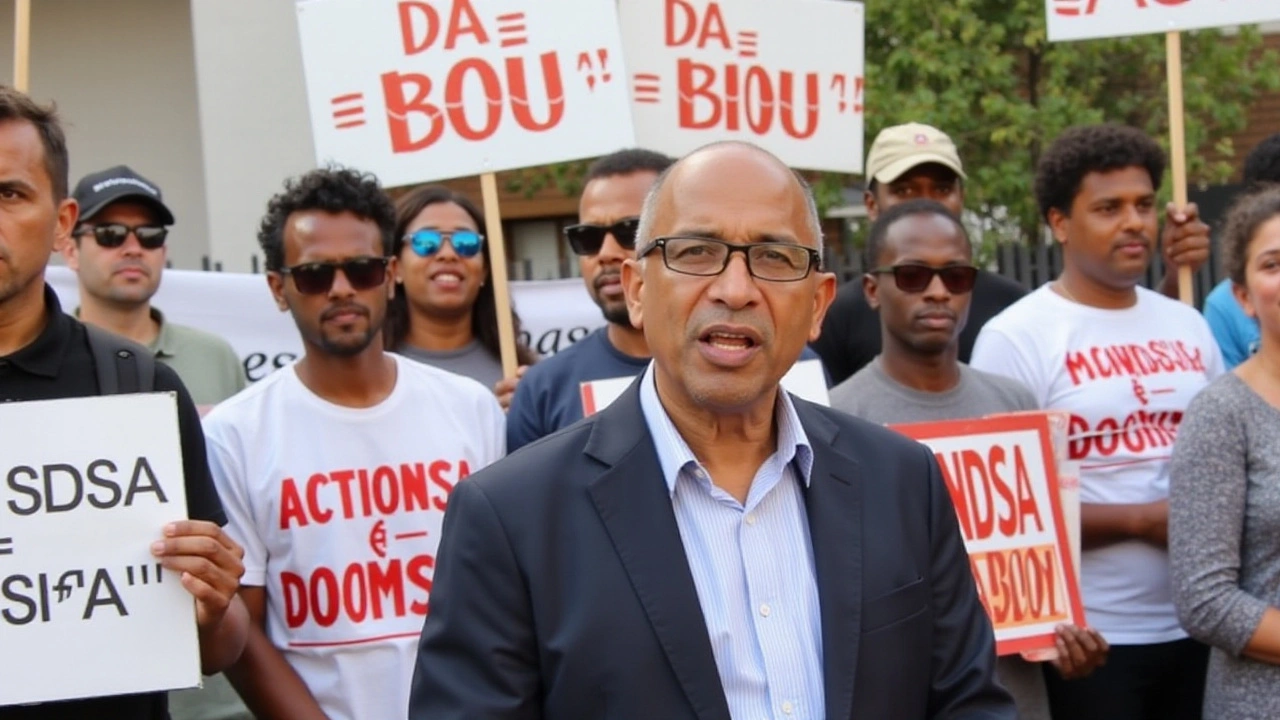 Sep, 26 2024
Sep, 26 2024
Political Upheaval in Tshwane
The political landscape of Tshwane witnessed a significant shake-up as Mayor Cilliers Brink was ousted from his position through a motion of no confidence. This motion, sponsored by the African National Congress (ANC) and backed by coalition partners such as the Economic Freedom Fighters (EFF), ActionSA, and the Patriotic Alliance (PA), culminated in Brink's removal from office.
Brink’s removal follows a turbulent tenure marked by intense criticism. The motion, which saw 120 councillors in favor, 87 against, and one abstention, marks the end of Brink's 18-month stint as the sixth mayor of Tshwane since 2016.
Contentious Debate and Accusations
The debate preceding the vote was anything but dull. It saw heated exchanges and pointed accusations, particularly from ActionSA’s Tshwane caucus leader Jackie Mathabathe. Mathabathe lambasted Brink's leadership, accusing him and his administration of prioritizing affluent suburbs while grossly neglecting the townships. She pointed to a myriad of issues resulting from this neglect, such as overflowing sewage, non-functional streetlights, and open trenches posing deadly hazards to children.
ActionSA's decision to part ways with the Democratic Alliance (DA)-led coalition was painted not merely as a political strategy but a stance against what they deemed as unacceptable conduct by the DA. This, according to Mathabathe, resulted in a palpable lack of respect and honesty, leaving communities in a state of turmoil.

Charges of Favoritism and Neglect
A significant part of the critique levied against Brink's administration was supposed favoritism and bias. Opposition parties accused the DA of violating democratic principles, alleging that beneficiaries of the administration's policies were selected based on their postal codes. This favoritism, they argued, left the townships languishing in systemic neglect.
Incidents cited during the debate were harrowing. There were reports of children tragically drowning in open trenches, an indictment of the pressing infrastructural failures. Such instances underscored the unsafe and unsanitary conditions plaguing the townships, which have long yearned for basic amenities and improvements.
Defensive Postures and Skepticism
In defence, the DA's Member of Mayoral Committee (MMC) for Human Settlements, Cllr Ofentse Madzebatela, highlighted the administration’s achievements, particularly its financial management. Madzebatela pointed to numerous awards from the South African Local Government Association (SALGA) as evidence of good governance. However, this defense was met with skepticism. Opposition councillors argued that the accolades could not obscure the pressing systematic neglect and decay of essential services under the DA’s watch.
Ramifications and Future Uncertainty
With Brink's removal, Tshwane finds itself at a crucial juncture, and the immediate future remains uncertain. The motion underscores deep-seated frustrations over the city's management and highlights the volatility within its political coalitions.
As Tshwane grapples with the aftermath of this vote, the challenge now lies in addressing the grievances that led to such a dramatic political shift. The townships, whose neglect became the epicenter of the debate, now stand as a testing ground for any subsequent leadership. The demand for infrastructural improvements and fair treatment has never been more poignant.
The coming days will reveal much about Tshwane’s political resilience and ability to rise from its troubled state. What remains clear is that for many residents, patience has worn thin, and the call for accountability has reached a fever pitch.
The ousting of Brink sends a potent message not just within Tshwane but across South Africa. It underscores an era where community voices demand to be heard, and leaders must heed the call for inclusive and equitable governance. The fabric of Tshwane’s political future now awaits the threads of change, woven by those who step up to mend the rifts and bridge the divides.

Eric DE FONDAUMIERE
September 26, 2024 AT 22:43Wow, this is crazy.
Pauline Herrin
September 27, 2024 AT 14:26The recent ousting of Mayor Brink underscores a profound breakdown in governance and accountability. It is evident that the coalition's failure to address infrastructural deficiencies fueled public discontent. Such a decisive motion of no confidence should serve as a catalyst for comprehensive reform, rather than merely reshuffling political power.
pradeep kumar
September 28, 2024 AT 06:33The council’s decision reflects genuine frustration among residents. Ignoring township needs only deepens the crisis.
love monster
September 28, 2024 AT 22:40From a governance‑performance lens, the coalition dynamics have introduced a volatility vector that destabilized service delivery pipelines. KPI adherence plummeted as political bargaining took precedence over operational KPIs.
Christian Barthelt
September 29, 2024 AT 14:46Honestly, this is just a textbook case of political theatre. The ANC and its partners exploited a simple vote to mask deeper systemic rot. No amount of awards can hide the fact that basic services are still failing.
Ify Okocha
September 30, 2024 AT 06:53Typical over‑hyped accolades while citizens drown in open trenches. The narrative you push is an outright denial of reality, and it’s infuriating to watch.
William Anderson
September 30, 2024 AT 23:00The removal of Mayor Brink is more than a political footnote; it is a symptom of a deeper, systemic malaise that has plagued Tshwane for years. Residents have endured endless promises that translate to nothing but potholes, flickering streetlights, and toxic sewage overflow. The rhetoric of “development” has been co‑opted by a cadre of politicians who prioritize affluent suburbs, leaving townships to fend for themselves. When children drown in unmarked trenches, it is not merely an administrative oversight-it is a moral failing that speaks to a government's abdication of its fundamental duty to protect its people. The ANC, EFF, ActionSA, and PA, while presenting themselves as champions of the disenfranchised, have effectively weaponized the motion of no confidence to consolidate power rather than address the underlying grievances. The DA’s defensive posturing, flashing awards from SALGA, feels like a desperate attempt to distract the populace from crumbling infrastructure and escalating social unrest. Such accolades, while perhaps deserved on paper, become hollow symbols when the lived reality involves daily battles for basic sanitation and safety. Moreover, the coalition’s fragmentation reveals a lack of coherent vision; shifting alliances cannot substitute for a steady, long‑term strategy. The public’s patience, once a far‑reaching wellspring of hope, is now a dried riverbed, echoing the cries of families who have watched their children suffer preventable tragedies. This political upheaval, therefore, is a watershed moment-an opportunity for a new leadership to emerge that genuinely prioritizes equitable service delivery, transparent budgeting, and inclusive policymaking. If the successors to Brink can harness the collective outrage into constructive change, Tshwane may yet recover its standing as a vibrant, livable city. Otherwise, the cycle of neglect will persist, and the city’s future will remain shrouded in uncertainty, with the most vulnerable shouldering the brunt of political gamesmanship.
Sherri Gassaway
October 1, 2024 AT 15:06One might contemplate whether the very framework of coalition governance inherently undermines the moral imperative to serve all citizens equally. The dialectic between power and responsibility becomes tangled when partisan ambition eclipses communal welfare.
Milo Cado
October 2, 2024 AT 07:13It’s encouraging to see citizens mobilizing for better services! 🙌 Let’s hope the next administration turns this momentum into real change. 😊
MONA RAMIDI
October 2, 2024 AT 23:20Seriously, this is the drama we’ve been waiting for! The streets are a mess and now the political theater adds extra sparkle. Can’t wait for the next episode.
grace riehman
October 3, 2024 AT 15:26Hey folks, let’s keep the convo respectful and inclusive. Everyone’s voice matters, even if they typo a word or two.
Vinay Upadhyay
October 4, 2024 AT 07:33Oh great, another self‑appointed expert spouting off. Newsflash: throwing around buzzwords doesn’t fix broken pipes. Maybe focus on actual solutions?
Eve Alice Malik
October 4, 2024 AT 23:40Anyone else wonder how the city plans to prioritize fixing those open trenches? It feels like they're always talking about big plans but nothing on the ground.
Debbie Billingsley
October 5, 2024 AT 15:46Our nation cannot tolerate such mismanagement. Strong leadership must be restored to uphold our values.
Patrick Van den Berghe
October 6, 2024 AT 07:53Fix it fast
Josephine Gardiner
October 7, 2024 AT 00:00In light of recent events, it is incumbent upon municipal authorities to undertake a rigorous audit of service delivery protocols, ensuring that future administrations are equipped to meet the exigent needs of all constituents with impartiality and diligence.